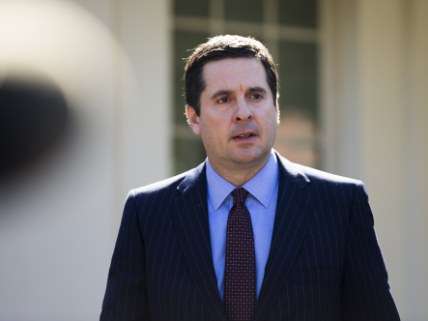Will the Prospect of Taking Trump Down Ruin Chances for Surveillance Reform?
Privacy concerns that are worth debating get sucked into White House fight.

It looks like whatever House Intel Committee Chair Rep. Devin Nunes (R-California) might have been attempting to accomplish yesterday when he held a press conference to reveal some post-election surveillance of Trump's transition team may have backfired.
Nunes, a Trump ally, was clearly attempting to draw attention to the argument that the intelligence community was violating the privacy of the incoming Trump administration in its data and information collection. He said the information he had received showed that the surveillance and data collection of Trump team communications was "incidental," meaning they likely were not surveillance targets themselves.
But Nunes running to the press and not actually informing the rest of his peers in the House Committee first subsequently made the story about Nunes and what he was trying to accomplish instead. Trump's critics, both on the left and the right, worry that Nunes' behavior is an attempt to interfere with a congressional investigation of any possible ties between Trump and the Russian government and whether anything possibly illegal has happened. Was this all about trying to help Trump? Trump himself immediately jumped on Nunes' comments in a Time interview to defend his wiretap conspiracy tweets, which at least suggests some interesting timing. Nunes has since apologized to his Democratic counterparts in the House for not telling them first before going to the press.
There is likely a very noncontroversial explanation for the data collection that implicates nobody in particular and helps inform Americans about how federal surveillance actually works if people are willing to—for however briefly—set aside their feelings about Trump. Folks may recall that prior to taking office, Trump and his transition team decided to start contacting and communicating with world leaders. In all likelihood the National Security Agency (NSA) had active permission to engage in surveillance of such people. It's not necessarily an indicator of a criminal investigation; it's the business of international intelligence.
So members of Trump's team may have ended up dragged into "incidental" surveillance because of the people they were talking to. As such, what happened with Trump's folks is a perfect opportunity for Americans to understand how "incidental" surveillance of citizens' works, what happened to the data, and the inherit risks of this level of collection for all of our privacy so at least we're all informed about how all of this works.
Privacy and civil liberties activists are calling for reforms to surveillance authorities in order to reduce the likelihood that private data or communications get retained and exposed the way it might have happened with Trump's team.
Also of interest: Nunes has said that actually, some of the names in these reports were still "masked" (redacted), but he was able to tell who the reports were talking about based on the context. In the wake of Edward Snowden's revelations about mass collection of data from Americans' phone and online communications, government officials (all the way up to President Barack Obama himself) attempted to assure people that nobody was reading through all of our emails or listening in to all of our phone calls. But they were collecting loads of metadata (where and who we were communicating with, for how long, when and how frequently, et cetera), and experiments have shown that enough metadata is available out there to extrapolate a lot about our private behavior.
But as long as this is a fight only over the behavior of Trump and his team, it's going to be tough to have a discussion or call for reform of these tools. As I noted yesterday, even vocal Democratic critics of the extent of federal surveillance are using all this to try to attack Trump's administration as potentially breaking the law even knowing full well that's not necessarily what the information collection means.
Mind you, it could very well be that Nunes is indeed trying to taint an investigation and that the Trump team might have been involved in some unseemly, even illegal behavior. That he's doing a terrible job at it probably says more about Nunes' poor political savvy than anything else. I'm not here to assist in defending Trump (not that he needs me to). I'm here to warn about the politically driven false choices tainting the debate. What the two "sides" in this fight are presenting to the public are not contradictory claims, and I'm going to keep trying to hammer that through. It's possible that Trump and/or his allies are involved in corrupt or illegal dealings with a foreign country and that it's normal and expected for our federal intelligence agencies to be using surveillance tools to get at the truth. It's also possible that the intelligence community is abusing access to surveillance data and leaking information for the deliberate purpose of discrediting and hamstringing the Trump administration. And this administration is—like it or not—legally and democratically in charge of the executive branch of the government.
If Trump's foes are fine with data collected by surveillance possibly being abused to discredit him, that doesn't bode well for the possibility of ratcheting back the surveillance of all the rest of us.


Show Comments (40)